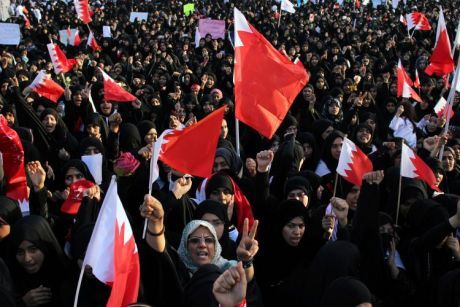Features
You are here
Bahrain: 200 years of resistance

July 29, 2012
Inspired by the Egyptian and Tunisian revolutions, hundreds of thousands of Bahrainis flooded the streets and marched to occupy the Pearl Roundabout on February 14, 2011 starting the Bahraini revolution. However, Bahraini struggles started two centuries ago when the Al-Khalifa tribe invaded their island, confiscated farmers’ lands, and exploited people.
Historians who narrated eyewitness accounts of the Al-Khalifa invasion mention the most brutal images that anyone could ever imagine. In 1783, the Al-Khalifa Bedouin tribe invaded Bahrain. Locals, who were mainly simple farmers and fishermen, showed resistance. Folklore tales talk about the bravery of those simple fighters who had nothing to fight with except their farming sickles. They were massacred and their mutilated bodies rested by the sea. Since then, beaches in Bahrain are bloodstained. The sea turned into Al-Khalifa property leaving no place for fishermen to make their living.
The original people of Bahrain were forced to leave their homes and lands to live together in villages with small packed houses. Confiscated lands were distributed amongst Al-Khalifa family members and their loyalists. Even now, the situation is not much better. Aboriginal Bahrainis, the Shiite majority, face discrimination. They face financial, social and even religious oppression by the ruling minority.
Colonialism and “independence”
Less than a hundred years after the Al-Khalifa invasion, Bahrain became a British colony. In order for Al-Khalifa to stay in power, treaties were signed with the British occupiers. Thus, ordinary people in Bahrain became exploited by the British colonial power and the regime at the same time. Though, there were waves of resistance during the British occupation.
In 1968, the British forces decided to leave Bahrain after a series of protests and uprisings that erupted in 1965. However, Bahrain never became independent, and people in Bahrain have never had the chance to choose their destiny. In order for the British to leave, the colonial power (under UN agreement) gave people in Bahrain two options: either accept Al-Khalifa as ruler or to be an Iranian colony (under the Shah’s regime).
Known for the love of their homeland, Bahrainis voted to stay with Al-Khalifa rather than giving their lands to the monarchy in Iran. So called “independence” was announced. Imperialists stayed in control, and the people continued their revolts. For instance, Ian Henderson, British security officer, was the Head of General Intelligence Bureau in Bahrain (1966-2000). According to Bahrain Youth Society for Human Rights: “Henderson used to launch group torture operations inside Bahraini prisons. He arrested countless numbers of Bahraini citizens. He played a key role in the disappearance and forced exile of many Bahraini human rights activists and political dissidents.”
Resistance today
Henderson and other torturers are free, while another generation of activists is now being tortured in prison. Not only activists are paying the price of demanding freedom; ordinary people in Bahraini cities and villages are being attacked every day since February 14, 2011. The situation has not been worse than what used to happen during Bahraini uprisings in the last century, but due to social media, evidence of the brutality of the Al-Khalifa regime is being broadcast everywhere. There has not been enough media coverage, but networks of activists risking their lives to convey the truth make it possible for many to see images of mutilated bodies, suffocated children, and beaten youth.
Activists in Bahrain have realized that it’s only because of large powers, like the United States, that the Al-Khalifa regime still exists today; Bahrain is the home to the US Naval Fifth Fleet and the US wants to maintain a stable client state in the region. A democracy in Bahrain would weaken imperialist power in the region. Thus, the US have not even ceased arms deals with the Bahraini government as they attack protestors in the streets. The US supply the weapons used to attack peaceful protestors, and those tear gas canisters thrown at homes are made in the United States.
In addition to supporting the Al-Khalifa regime, the West (including Canada) has been backing the monarchy in Saudi Arabia that is well known for human rights violations and suppressing religious and social freedoms. To finish drawing the painting of oppression with more blood, the Bahraini regime called on Saudi troops to suppress the pro-democracy movement in Bahrain. Troops from the United Arab Emirates also participated, but Saudi Arabia contributed the most. Thousands of Bahrainis, including children, have been killed, wounded, tortured and arrested. Al-Khalifa regime is the only regime that has invited troops from other countries to attack peaceful protestors. The number of causalities is very high compared to the population of the small island, which is hardly above one million including expatriates. Thousands of workers have been dismissed from their jobs for participating in protests, while members and leaders of unions have been jailed.
Solidarity
If there is anyway in which revolutionaries around the world can support people in Bahrain, it is by condemning the silence and the support of Western governments to the oppressive Al-Khalifa regime. Demanding the stop of Western arms deals (mainly from the US, but other countries as well) is one way to save innocent people in Bahrain. The only way in which the revolution in Bahrain will be successful is to stop imperial powers from backing the oppressive state.
Being in solidarity with protestors in Bahrain means endorsing their chant used now in demonstrations “America, your arms kill us.” The fight for democracy in Bahrain continues with people demanding an end to the Western backed Al-Khalifa monarchy.
Section:
- Log in to post comments









